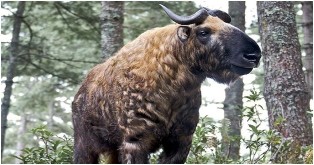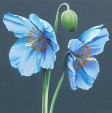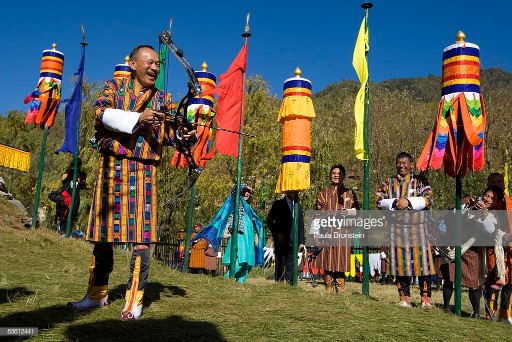NATIONAL SYMBOLS

National Emblem

National Animal

National Flower

National Game
Cradled in the folds of the Himalayas, Bhutan has relied on its geographical isolation to protect itself from outside cultural influences. A sparsely populated country bordered by India to the south, and China to the north, Bhutan has long maintained a policy of strict isolationism,
both culturally and economically, with the goal of preserving its cultural heritage and independence.The national emblem is a circle with two double diamond thunderbolts placed above a lotus, topped by a jewel, and framed by two dragons. The thunderbolts represent harmony between secular and religious power. The lotus represents purity, the jewel represents sovereign power, and the two dragons represent Druk-Yul ("Land of the Thunder Dragon") the original name of Bhutan.The national flag is divided diagonally by two blocks of different colors with a white dragon across the middle. The top part of the flag is golden yellow, which represents the secular power of the king, and the lower part is orange, which symbolizes the Buddhist religion. The dragon, who represents Bhutan, holds jewels in its claws, which stand for the wealth and perfection of the country.The national flower is the blue poppy, which grows at the high altitudes. The national tree is the cypress. The Bhutanese people associate with it because it is straight andstrong and can grow even in inhospitable soil. The national bird is the raven, which also adorns the royal hat. The national animal is an extremely rare mammal called the takin.It lives in flocks in areas 13,000 feet (4,000 meters) high and eats bamboo.
The national dress of Bhutan is called the 'Gho' for men and 'Kira' for women. It was introduced during the 17th century by Zhabdrung Ngawang Namgyal to give the Bhutanese a unique identity. In an effort to preserve and promote its cultural heritage, all Bhutanese are required to wear the national dress in government offices, schools and on formal occasions.
Bhutan believes in the philosophy of Gross National Happiness. Sustainable development and happiness are emphasized more than Gross Domestic Product. Each and every policy of Bhutan first has to go through a checklist that qualifies it to be passed as a Gross National Happiness policy.
.
both culturally and economically, with the goal of preserving its cultural heritage and independence.The national emblem is a circle with two double diamond thunderbolts placed above a lotus, topped by a jewel, and framed by two dragons. The thunderbolts represent harmony between secular and religious power. The lotus represents purity, the jewel represents sovereign power, and the two dragons represent Druk-Yul ("Land of the Thunder Dragon") the original name of Bhutan.The national flag is divided diagonally by two blocks of different colors with a white dragon across the middle. The top part of the flag is golden yellow, which represents the secular power of the king, and the lower part is orange, which symbolizes the Buddhist religion. The dragon, who represents Bhutan, holds jewels in its claws, which stand for the wealth and perfection of the country.The national flower is the blue poppy, which grows at the high altitudes. The national tree is the cypress. The Bhutanese people associate with it because it is straight andstrong and can grow even in inhospitable soil. The national bird is the raven, which also adorns the royal hat. The national animal is an extremely rare mammal called the takin.It lives in flocks in areas 13,000 feet (4,000 meters) high and eats bamboo.
Bhutan believes in the philosophy of Gross National Happiness. Sustainable development and happiness are emphasized more than Gross Domestic Product. Each and every policy of Bhutan first has to go through a checklist that qualifies it to be passed as a Gross National Happiness policy.